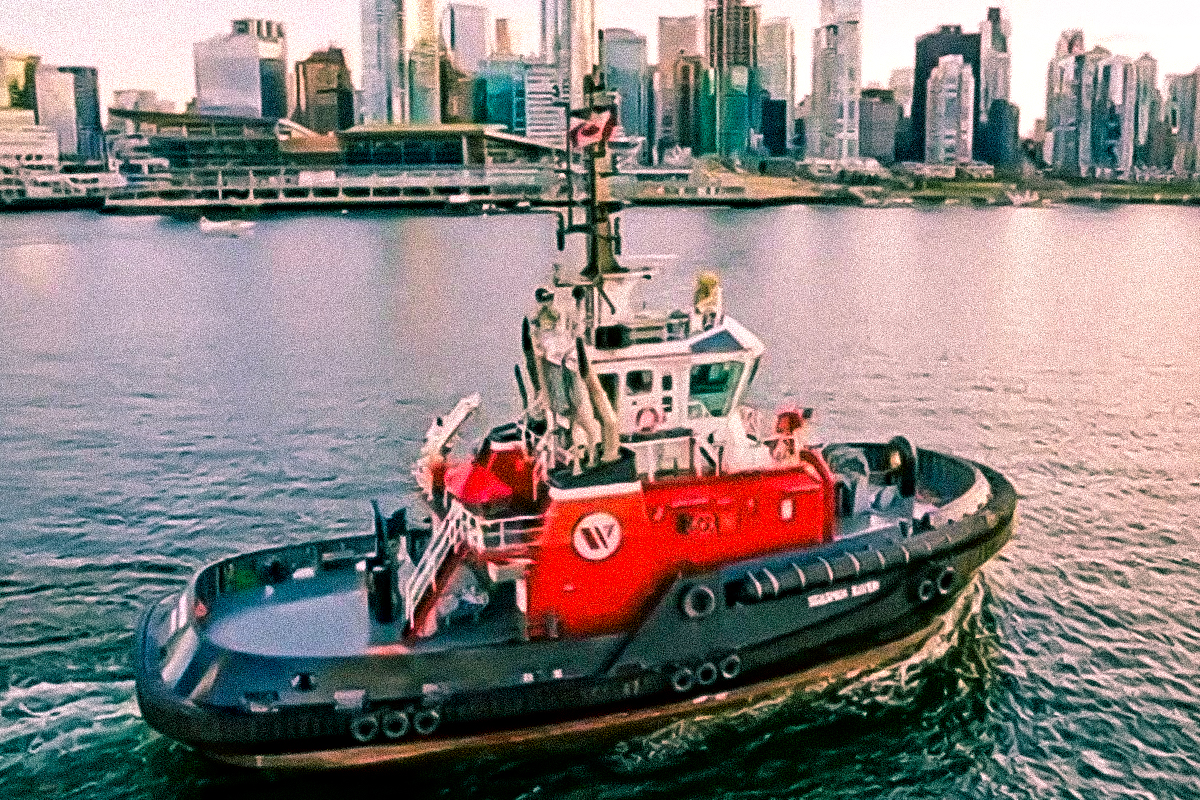
On Aug. 25, tugboat captains and other crew with the Canadian Merchant Service Guild went on strike after contract negotiations stalled. They had been working without a contract since 2019. These workers operate 30 tugboats for Seaspan ULC—one of Canada’s largest ship makers and tugboat operators—that assist in refilling bunker fuel, ship docking, and escorting tankers in and out of Vancouver. Seaspan also operates ferries and barges, making them a key link in the economy of British Columbia and a connector between the province to the rest of the Pacific Northwest. With 2,800 employees it’s one of the largest private employers in the province.
While the current strike affects tugboat operators, 1,000 unionized welders, pipefitters, electricians, and a host of other trades commenced a solidarity strike on Sept. 8. Toby Charette, president of the Marine & Shipbuilders Local 506 (CMAW), has said the strike was brought on because the guild was “offered an embarrassing offer for their contract” which expired three years ago. In a show of true workers’ solidarity, Charette also said “as union brothers, we cannot cross this picket line, we will not cross a picket line, ever. So we’re standing out here waiting for Seaspan, to come to terms and bargain in good faith with the guild. And give them what they deserve. Very plain and simple.” These workers are not on strike themselves, but they have effectively stopped work on two massive Navy joint support ships and an offshore science vessel for the Coast Guard. This is a textbook example of the solidarity the movement needs to win, and it should spread to the rest of the marine industry in B.C. as a generalized struggle for improved wages as inflation continues to skyrocket.
More recently on Sept. 27, a B.C. Supreme Court judge dismissed a petition from the Vancouver Shipyards and the Vancouver Drydock preventing striking workers from picketing their operations in North Vancouver. The companies tried to argue that the pickets were set up to deliberately hinder their operations, causing “economic loss” and “loss to the shipyards’ professional reputation.” This might come as a surprise to the shipyard bosses, but this is the entire point of a successful strike! A strike which doesn’t do this is not worthy of the name.
There is a strike mood in the air, with several strikes or threats of strikes from the BCGEU to CUPE to other sections of Seaspan itself. It’s no shock really that with higher and higher rents and increasing inflation, this latest strike is now added to that growing list.
Simply put, wages are not keeping up with the cost of living. But that’s true for workers everywhere in the province. Specifically in shipping, there’s an ongoing shortage of experienced mariners in British Columbia and around the world. Also, supply chain shortages and disruptions have forced more overtime and made the industry as a whole a less dependable place to work.
These workers are a critical link in the economic activity of Vancouver and British Columbia, not just in the transport of goods, but also in tourism. This gives them an excellent position from which to make demands. As an example, the striking Seaspan tugboat operators left a barge tied to a cruise ship and then refused to remove it for 24 hours. This is direct evidence of both how important their job is and an example of how to effectively run a strike. After all, while the bosses will cry bloody murder at the loss of profits, the fact is that without an economic and material impact no serious gains can be made. It’s precisely by withholding our labour that we can wring concessions from the bosses.
However, business interests in Vancouver will not just sit on their hands. There are other tugboat companies not on strike and shipping interests will try to offload Seaspan’s shipping volume onto these other companies. It’s not clear if they will be able to. Again, with the general shortage of captains and skilled maritime workers in B.C., it’s unlikely that they will simply be able to “make up the difference.” But in either case, the only real assurance for a successful strike is militancy on the picket line and the broadening of the strike to the widest possible layers.
There’s no telling just how long this strike will last, but the solidarity from CMAW Local 506 has given the strike a powerful impetus to continue. A similar strike by bus drivers on the Sea-to-Sky Highway went on for months but eventually ended in a victory for the union. The central issue there was once again a cost-of-living adjustment (COLA) to protect wages against rising inflation, which the Sea-to-Sky workers won. As the BCGEU strike and now the Seaspan strike show, rank-and-file union members have increasingly put pressure on union leaderships to fight for COLA agreements in the face of rising inflation and the growing cost-of-living crisis.
There are rumblings of strike action from several unions and surely more to come. With no change in the situation in terms of high inflation, workers will undoubtedly continue to vote in favour of strike action. Ultimately, only united action from the unions will win better conditions and COLA protection. Timid and isolated job actions with the intention of “politely” asking for wage increases and improved working conditions, meanwhile, are easier to isolate and neutralize. We need to fight back against inflation and the greed of the bosses. The only way to do that is to return to the militant labour traditions of the past. The crisis of capitalism itself is forcing workers to learn these lessons increasingly rapidly. The labour movement must make it clear to everyone that picket lines mean do not cross, and give every support to striking workers. Through solidarity and struggle the workers will gain the confidence to fight and to win!
Say no to wage cuts!
Strike against inflation!
Fight for COLA!
Victory to the Canadian Merchant Service Guild!

